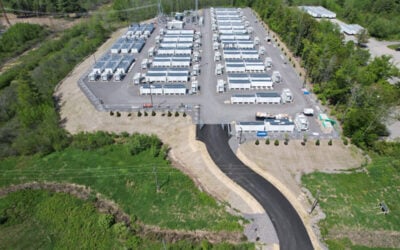24M claims its battery technology can eliminate 80% of inactive materials from Li-ion cells. Image: 24M facebook page.
24M, a battery company that claims it can achieve 50% cost-savings over existing Li-ion technology and hit US$100 per kWh by 2020, is positioning itself as a ‘disruptor’ of the energy storage space, an industry analyst has said.
In a Guest Blog to be published later this week on PV Tech Storage, Lilia Xie of Lux Research writes that 24M, which was spun out of A123 Systems in 2010, is “positioning itself as a disruptor to the entrenched lithium-ion (Li-ion) cell design and manufacturing process”.
The company claims its battery design eliminates over 80% of the ‘inactive’ materials in a lithium-ion battery and says it is aimed at the markets for grid or EV applications. The batteries replace the films made of solid electrode materials in standard Li-ion cells with Li-ion cathode and anode materials suspended in conventional liquid electrolytes, forming semi-solid electrodes instead.
Founded by an MIT (Massachusetts Institute of Technology) professor, Yet-Ming Chiang, 24M exited its ‘stealth mode’ earlier this month and unveiled the new design. At the time, Yet-Ming, the company’s chief scientist, said that while lithium ion is a brilliant technology, “the economics are flawed”. Yet-Ming claims 24M has “fixed those flaws”.
Try Premium for just $1
- Full premium access for the first month at only $1
- Converts to an annual rate after 30 days unless cancelled
- Cancel anytime during the trial period
Premium Benefits
- Expert industry analysis and interviews
- Digital access to PV Tech Power journal
- Exclusive event discounts
Or get the full Premium subscription right away
Or continue reading this article for free
“The lithium-ion battery is a brilliant, enabling technology, but its economics are flawed,” Yet-Ming said.
“It’s prohibitively expensive; it’s cumbersome and inefficient to make; and today’s version is approaching the limits of its cost reductions. 24M has fixed the flaws. We’ve made the world’s favourite battery better, fundamentally changing its cost curve by designing a more elegant and simpler cell and then making the batteries the right way – the way they should have been made from day one.”
Yet-Ming claimed the battery technology, developed in his lab at MIT, demonstrates simplicity of design which enables an equally simple manufacturing process, making it less capital intensive and requiring less high volumes of production to hit the best cost reduction points.
“
If its manufacturing process is truly scalable at low costs and the performance of its cells lives up to its claims, 24M’s technology is potentially disruptive.”
Lithium is the world’s favourite battery technology for energy storage, but remains flawed, 24M says.
Lilia Xie writes in the PV Tech Storage Guest Blog to be published on Thursday that while the claims are still to be fully proven, 24M could become a significant contributor to the industry’s evolution.
“If its manufacturing process is truly scalable at low costs and the performance of its cells lives up to its claims, 24M’s technology is potentially disruptive.”
Other companies in the battery storage space are of course starting to make claims of radical new approaches and ever-decreasing costs, the most obvious being Tesla’s unveiling of stationary storage batteries that at utility scale are aiming for a price of US$250 per kWh as it builds and then scales up its Nevada Gigafactory over the next few years.
This week PV Tech Storage also reported on Pacadu, a new product from ASD Sonnenspeicher, which the German manufacturer says allows even for batteries of different types and from different manufacturers to be added in parallel circuits to build systems of up to 1GWh in scale.
Other attempts at reducing costs and building scale across the industry include initiatives in several global regions to repurpose or reuse EV batteries for grid applications. Meanwhile, grid-scale lithium ion also faces competition from flow batteries.
Read PV Tech Storage’s Guest Blogs here.





